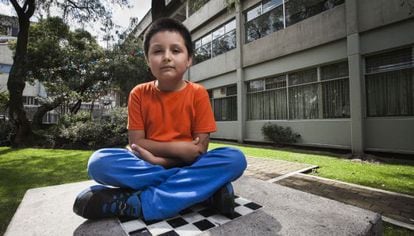The Mexican nine-year-old studying chemistry at university
Carlos Santamaría is finishing school online so he can also take college classes

Carlos Santamaría Díaz’s feet do not touch the floor when he sits down at his desk in the chemistry department at the National Autonomous University of Mexico (UNAM). That’s because, while his classmates all seem to have finished college at the very least, Carlos is just nine years old.
He learned to read at the age of three and became interested in chemistry when he was five. “He has a gift for processing information,” says his father, Fabián Santamaría. “He began going to nursery school when he was a year and half. When they taught him a letter, he wanted to know all of them. When they taught him a planet, he looked for all of them.”
When they taught him a letter, he wanted to know all of them. When they taught him a planet, he looked for all of them”
His parents avoid using the word “genius” and prefer only to rely on the facts: “By the age of five he could understand a whole high school science book and he learned the periodic table in a few weeks.”
Since Carlos would fall asleep in his classes and yet get good grades in all of them, his parents soon realized they had to find something more for their son. As he himself says, laughing: “None of the classes were hard for me but I did not like any of them. I was very bored.”
Carlos still does not understand why so many people want to film his story. “I am studying chemistry because that’s what I like ... even though when I was three years old I liked astronomy better,” he explains, without a hint of grandeur.
Finding a place where Carlos would feel stimulated was not easy. His parents felt that Mexican schools were closing their doors to them, saying their son had an exceptional memory but did not understand the subjects he was talking about. They decided to travel to Valencia, Spain, for a year where they received similar responses.
I never considered myself the best in my class, but I knew I was good”
But one chemistry professor who headed a laboratory in the Valencia town of Alboraya took Carlos in for an hour once a week. She exposed him to complicated scientific concepts and he devoured them. Fabián Santamaría recalls what the researcher told him: “I don’t like that he’s losing his interest in school because he has the mind of a scientist and he will get bored in school. But it’s not the fault of the primary school teachers either. Don’t expect them to understand the chemistry that he already knows.”
Once the Santamaría family returned home, they decided to approach UNAM. Carlos’s father went to the orientation for new college students and asked the college to register his son. The entry exam was an interview with chemistry doctor Eduardo Rodríguez de San Miguel. It took him 15 minutes to admit Carlos. “I was impressed,” the researcher says. “I asked him about the generic aspects to determine his aptitude. It’s not that he is a genius who knows everything but he focuses his attention on what interests him. When I asked him about his interests, he immediately brought up chemistry topics.”
Carlos’s parents have decided to take him out of the traditional school system. He will begin fourth grade online through a program they found in Spain. Fifty-percent of his grades will depend on trimester exams and the rest will come from a sit-down test at the Spanish embassy. Meanwhile, he will continue studying biochemistry and molecular energy at UNAM between 5pm and 9pm every day.
“I don’t know what I want to be when I grow up, I just know it will be something related to science,” Carlos says. The young university student also likes to play with his cousins, ride his bike and play video games. “Mostly Mario Bros,” he says.
Juan Carlos Manrrique, a 38-year-old biochemical engineer and a doctorate student in nuclear science, was Carlos’s classmate in the analytical chemistry module. “He understood everything like the rest of us, participated, and asked questions like any other.”
Carlos knows he is studying topics that are unusual for his age. “I understand some things quickly but others, like algebra equations, take me a little longer,” he says. Worried that he will not have time to eat his chocolate pastry before going to class, Carlos admits he gets nervous during interviews. But, as time goes on, he is finding talking to the cameras more and more fun.
“I never considered myself the best in my class,” he says, “but I knew I was good.”
Translation by Dyane Jean Francois










































